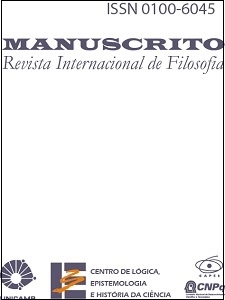Resumen
Husserl developed – independently of Frege – a semantics of sense and reference. There are, however, some important differences, specially with respect to the references of statements. According to Husserl, an assertive sentence refers to a state of affairs, which was its basis what he called a situation of affairs. Situations of affairs could also be considered as an alternative referent for statements on their own right, although for Husserl they were simply a sort of referential basis. Both Husserlian states of affairs and situations of affairs are extensional. Tarskian semantics can be rendered as a sort of state of affairs semantics. However, to assess adequately the existence of dual theorems in mathematics and, more generally, seemingly unrelated interderivable statements like the Axiom of Choice and its many equivalents, states of affairs (and truth-values) are not enough. We need a sort of refinement of the notion of a situation of affairs, namely what we have called elsewhere an abstract situation of affairs. We are going to introduce abstract situations of affairs as equivalence classes of states of affairs denoted by closed sentences of a given language which are true in the same models. We first sketch the procedure for a first-order many-sorted language and then for a second-order manysorted language.
Citas
Barwise, J., Feferman, S. (eds.). Model Theoretic Logics. New York/ Berlin: Springer, 1985.
Chang, C. C., Keisler, H. J. Model Theory, third edition. Amsterdam: North Holland, 1990.
Frege, G. Über Sinn und Bedeutung. Zeitschrift für Philosophie und Philosophische Kritik, vol. 100, pp. 25-50, 1982.
Frege, G. Der Gedanke. Beiträge zur Philosophie des deutschen Idealismus I, pp. 58-77, 1918.
Frege, G.Grundgesetze der Arithmetik [1893-1903]. Repr. Hildesheim: Olms, 1962.
Frege, G.Begriffsschrift [1879]. Repr. Hildesheim: Olms, 1964.
Frege, G. Wissenschaftlicher Briefwechsel. Edited by G. Gabriel, H. Hermes, F. Kambartel, C. Thiel and A. Veraart. Hamburg: Felix Meiner, 1976.
Frege, G. Die Grundlagen der Arithmetik [1984]. Centernarausgabe. Edited by Christian Thiel. Hamburg: Meiner, 1986.
Frege, G. Kleine Schriften. Edited by U. Angelelli, second edition. ildesheim: Olms, 1911.
Husserl, E. Logische Untersuchungen [1900-1901]. Husserliana, vol. VIII and XIX. The Hague: Kluwer, 1975 and 1984a.
Husserl, E. Erfahrung und Urteil [1939], fifth edition. Hamburg: Felix Meiner, 1976.
Husserl, E. Einleitung in die Logik und Erkenntnistheorie. Husserliana, vol. XXIV. Dordrecht: Kluwer, 1984b.
Husserl, E. Vorlesungen über Bedeutungslehre. Husserliana, vol. XXVI. Dordrecht: Kluwer, 1987.
Moore, G. H. Zermelo’s Axiom of Choice. New York: Springer, 1982.
Moschovakis, Y. N. Notes on Set Theory. New York: Springer, 1994.
Rosado Haddock, G. E. Remarks on Sense and Reference in Frege and Husserl. Kant-Studien, 74, no 4, pp. 425-439, 1982.
Rosado Haddock, G. E. On Frege’s Two Notions of Sense. History and Philosophy of Logic, 7, no 1, pp. 31-41, 1986.
Rosado Haddock, G. E. On Husserl’s Distinction between State of Affairs (Sachverhalt) and Situation of Affairs (Sachlage) . In: Seehbohm et al. (eds.) (1991), pp. 31-48.
Rosado Haddock, G. E. Interderivability of Seemingly Unrelated Mathematial Statements and the Philosophy of Mathematics. Diálogos, 59, pp. 121- 34, 1992.
Rubin, H., Rubin, J. E. Equivalents of the Axiom of Choice II. Amsterdam: North Holland, 1985.

Esta obra está bajo una licencia internacional Creative Commons Atribución 4.0.
Derechos de autor 2007 Manuscrito: Revista Internacional de Filosofia

